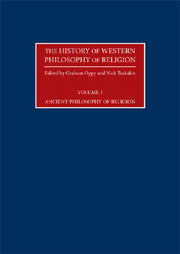Book contents
- Frontmatter
- Contents
- Editorial Introduction
- Contributors
- 1 Ancient Philosophy of Religion: An Introduction
- 2 Pythagoras
- 3 Xenophanes
- 4 Socrates and Plato
- 5 Aristotle
- 6 Epicurus
- 7 The Stoics
- 8 Cicero
- 9 Philo of Alexandria
- 10 The Apostle Paul
- 11 Plutarch of Chaeroneia
- 12 Sextus Empiricus
- 13 Early Christian Philosophers: Justin, Irenaeus, Clement of Alexandria, Tertullian
- 14 Origen
- 15 Plotinus
- 16 Porphyry and Iamblichus
- 17 The Cappadocians: Basil of Caesarea, Gregory of Nazianzus, Gregory of Nyssa
- 18 Augustine
- 19 Proclus
- 20 Pseudo-Dionysius
- Chronology
- Bibliography
- Index
4 - Socrates and Plato
- Frontmatter
- Contents
- Editorial Introduction
- Contributors
- 1 Ancient Philosophy of Religion: An Introduction
- 2 Pythagoras
- 3 Xenophanes
- 4 Socrates and Plato
- 5 Aristotle
- 6 Epicurus
- 7 The Stoics
- 8 Cicero
- 9 Philo of Alexandria
- 10 The Apostle Paul
- 11 Plutarch of Chaeroneia
- 12 Sextus Empiricus
- 13 Early Christian Philosophers: Justin, Irenaeus, Clement of Alexandria, Tertullian
- 14 Origen
- 15 Plotinus
- 16 Porphyry and Iamblichus
- 17 The Cappadocians: Basil of Caesarea, Gregory of Nazianzus, Gregory of Nyssa
- 18 Augustine
- 19 Proclus
- 20 Pseudo-Dionysius
- Chronology
- Bibliography
- Index
Summary
Socrates (469–399 bce) of Athens was the son of Sophroniscus (father) and Phaenarete (mother), and husband of Xanthippe, with whom he had three sons. Although Socrates never wrote anything, his many years of philosophical discussion established him as the founder of Western moral theory. The main sources for his views are the Clouds by Aristophanes (a parody), the dialogues of Plato, various works by Xenophon and passages in Aristotle; since these sources offer differing perspectives, the task of determining Socrates' actual views is daunting.
Plato depicts Socrates as a man who disavows possessing any real wisdom himself (except the mere human wisdom of understanding that lack) and who pursues a divinely ordained philosophical mission that requires him to question those who profess moral wisdom to see if they actually possess it. This questioning – the famous Socratic method – involves asking interlocutors to define one of the canonical virtues – piety, justice, courage, moderation, wisdom – and then eliciting various other statements from them that then turn out to be mutually inconsistent, thus showing their lack of knowledge of the relevant virtue.
- Type
- Chapter
- Information
- The History of Western Philosophy of Religion , pp. 53 - 78Publisher: Acumen PublishingPrint publication year: 2009
- 2
- Cited by

